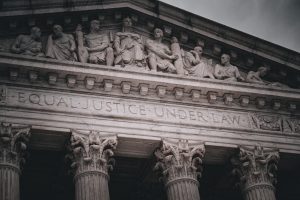
A group of Oklahoma faith leaders, public education advocates and public school parents — who are among the plaintiffs in a lawsuit to stop Oklahoma’s creation of the nation’s first religious public charter school — have urged the U.S. Supreme Court to protect religious freedom and public education by affirming that charter schools are public schools that must be secular and open to all students.
In an amicus brief filed April 7 in Oklahoma Statewide Charter School Board v. Drummond, the group explained that the Oklahoma Supreme Court correctly ruled last year that Oklahoma’s charter schools are public schools and, as governmental entities, must abide by the U.S. Constitution’s protections for religious freedom and church-state separation. Therefore, the proposed St. Isidore of Seville Catholic Virtual School, which intends to indoctrinate students in one religion, cannot operate as a public charter school.
The groups that filed the legal brief, which include OKPLAC (the Oklahoma Parent Legislative Advocacy Coalition) and eight Oklahoman taxpayers, are plaintiffs in OKPLAC v. Oklahoma Statewide Charter School Board, a separate lawsuit in Oklahoma state court challenging the charter school board’s approval of St. Isidore’s application to become a public school. That case is on hold while the case before the U.S. Supreme Court is being resolved.
The plaintiffs in OKPLAC are represented by Americans United, the American Civil Liberties Union, Education Law Center, and Freedom From Religion Foundation, with support from Oklahoma-based counsel Odom & Sparks PLLC and J. Douglas Mann.
“The law is clear: Charter schools are public schools and must be secular and open to all students,” the groups said in a statement. “The Oklahoma Supreme Court correctly found that the state’s approval of a religious public charter school was unlawful and unconstitutional. We urge the U.S. Supreme Court to affirm that ruling and safeguard public education, church-state separation, and religious freedom for all.”
Oral arguments in the case were held April 30.
In other news about the Supreme Court:
- Americans United was joined by 11 religious and civil rights organizations in urging the Supreme Court to affirm that it is not a religious freedom violation for a public school district to educate students about secular concepts that may not align with their families’ religious beliefs.
In an amicus brief filed April 9 in the case Mahmoud v. Taylor, AU and allies explained that the inclusion of books with LGBTQ+ characters in a large Maryland school district’s language arts curriculum does not pressure or coerce schoolchildren to do anything that violates their families’ religious beliefs.
Rather, the brief notes that it would violate the religious freedom of every parent and student if the U.S. Supreme Court accepts the Becket Fund for Religious Liberty’s rationale and requires public schools to implement an infeasible opt-out system for parents with religious objections to elements of the curriculum. School administrators will be more likely to remove any lessons, books or materials that could be challenged, resulting in public school curricula structured around the religious beliefs of a select few parents — a clear violation of all students’ and families’ religious freedom, especially for families from minority religions or who are nonreligious.
“This is an underhanded attempt to strike books and classroom lessons that don’t align with Christian Nationalist views from local public school districts,” said Rachel Laser, president and CEO of Americans United. “A handful of vocal parents with anti-LGBTQ+ religious beliefs do not get to dictate what appears in public school classrooms and libraries. This case is part of a broader Christian Nationalist agenda to impose a narrow set of religious beliefs on America’s schoolchildren. We urge the U.S. Supreme Court to reject Becket Fund’s scheme to undermine public education and church-state separation.”
The court heard oral arguments in the case April 22.
- The high court heard oral argument March 31 in a case that could affect the rights of millions of Americans who work for religiously affiliated organizations.
The case, Catholic Charities Bureau v. Wisconsin Labor & Industry Review Commission, involves a challenge to the Wisconsin unemployment tax system that exempts churches and religiously affiliated organizations operated “primarily for religious purposes.” The plaintiffs — sub-entities of the Catholic Charities Bureau that run charitable service programs — claim that they should be entitled to the benefit of this exemption.
Americans United filed a friend-of-the-court brief in early March in support of Wisconsin, arguing that the Supreme Court should uphold the state court’s interpretation of its statute.
AU argues that allowing a broad exemption would harm workers. For example, around 20% of hospitals in the United States are religiously affiliated. In addition, according to a conservative estimate, 1.2 million people work for religiously affiliated organizations. These numbers are growing.
A decision is expected in all three cases by the end of June.